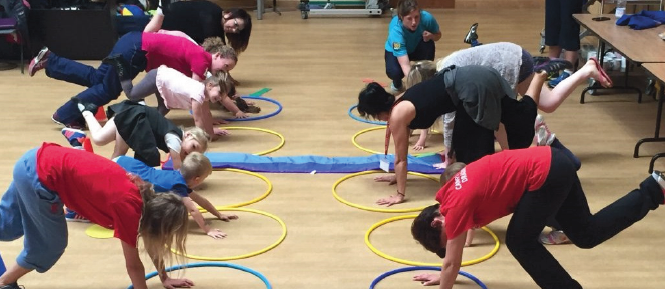
THE UNIVERSITY OF WALES TRINITY SAINT DAVID’S Wales Institute of Physical Literacy (WIPL), based in Carmarthen, is currently running a major programme of professional development in West Wales to develop pupils’ motor development in the Foundation Phase.
The programme is part of the Welsh Government-funded Physical Literacy Programme for Schools which the Wales Institute for Physical Literacy manages in the region.
The project is being led by Dr Nalda Wainwright, Director of the Wales Institute of Physical Literacy, who explains how the programme came about: “Earlier research that we carried out in the Foundation Phase found that although children were developing their physical literacy, they were not making progress in all of their motor skills, like throwing and catching. Developing a range of these skills is vital if children are going to be able to have an active healthy life.
“Colleagues in The Ohio State University have devised and researched a programme called Successful Kinesthetic Instruction for Pre-schoolers (SKIP) aimed at developing the skills that we had seen were lacking in the Foundation Phase, so it was an obvious next step for us to introduce this in the region. We are now researching this to ensure that pupils are making progress in these skills.”
This research project is assessing whether a structured programme for motor skill development can have a positive impact on object control and loco-motor skills. It will assess whether the results are similar in Wales to those of previous studies carried out in the USA by Jackie Goodway, Professor of Kineseology at The Ohio State University.
The findings of Professor Goodway’s projects have also already suggested that impact of early motor development is important for lifelong engagement in physical activity and enabling progress in physical literacy. Dr Wainwright’s research will look to see whether the SKIP project trialled in West Wales can have a similar outcome here too.
“We have been assessing the impact of the project on samples of pupils from schools across the region. The analysis of the data thus far shows we are having a significant impact on pupils’ motor skill development. Importantly, teachers are developing their understanding and confidence so we are building real capacity for sustainable long term change.
“Children are spending more and more time sitting still watching TV, playing on iPads, computers and phones,” continues Dr Wainwright. “This is worrying because we know from research that if children don’t learn to move well at an early age, they aren’t likely to become active as they grow up. This means they have a greater risk of being overweight or obese, developing type 2 diabetes, high blood pressure, osteoporosis and many other health conditions that are linked to lack of physical activity.
“The Foundation Phase is about teaching children through play – and although this is taught really well in the majority schools across Wales – the basic activities that help children develop their object control skills, such as catching and throwing, aren’t being taught.
“Education and high quality physical education in particular has an important role to play in fostering physical literacy so that young people are motivated and able to access a range of activities. This means that we catch the children before they start on a downward trajectory that could have a significant impact on the health of our nation.”
Due to her vast experience of developing and implementing SKIP projects in the USA, Professor Jackie Goodway of The Ohio State University and an Honorary Research Fellow at WIPL has been working closely with Dr Wainwright on the pilot project in South West Wales.
“The role of SKIP is to really develop children’s motor competence,” says Jackie Goodway.
“From a scientific standpoint, we’re increasingly aware of the importance of children developing motor competence very early on in life, particularly in those early years. If children aren’t active early and they don’t learn to develop their motor skills proficiently in the early years, by the time they get to adolescence, they’ve dropped out of being physically active, they tend to be more overweight, you’ll see diabetes, early onset of cardiac disease, so their health trajectory is just horrible – and that’s going to have a significant burden on the health system later in life.
“The other thing is that across the 20-25 years that we’ve been developing this programme, we’ve come to realise that it’s not just about motor-skill development but that moving is absolutely critical to brain development,” adds Professor Goodway. “There’s increasing evidence that suggests that children who move early and often using a programme like SKIP have better academic outcomes, they have better executive functions so they process information more efficiently, and from a social and emotional standpoint, they develop physical literacy and begin to see themselves as a mover and they’ll continue to do so across their life span.”
Speaking during a visit to Wales earlier this year, Professor Goodway added: “It’s really significant to be in Wales and to see so much excitement around SKIP. Children love to do it, teachers are really beginning to see it pay off with their children, parents are beginning to talk about how doing it at home really makes a difference to their children and so we need to begin to address this at a national level.”
The Wales Institute of Physical Literacy at UWTSD has a range of projects such as SKIP that will help Wales become a more physical literate nation. SKIP is aimed at early years and young children but Physical Literacy is developed throughout life. It is much more than learning skills and playing sport. It’s about being confident; motivated; and about understanding why activity is important and how to be active – whether that’s playing sport in a club, walking in the hills, doing yoga, cycling, swimming or taking a dance class.


















Add Comment